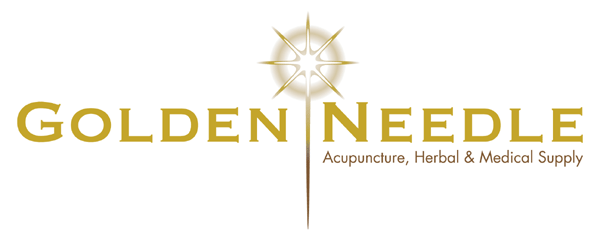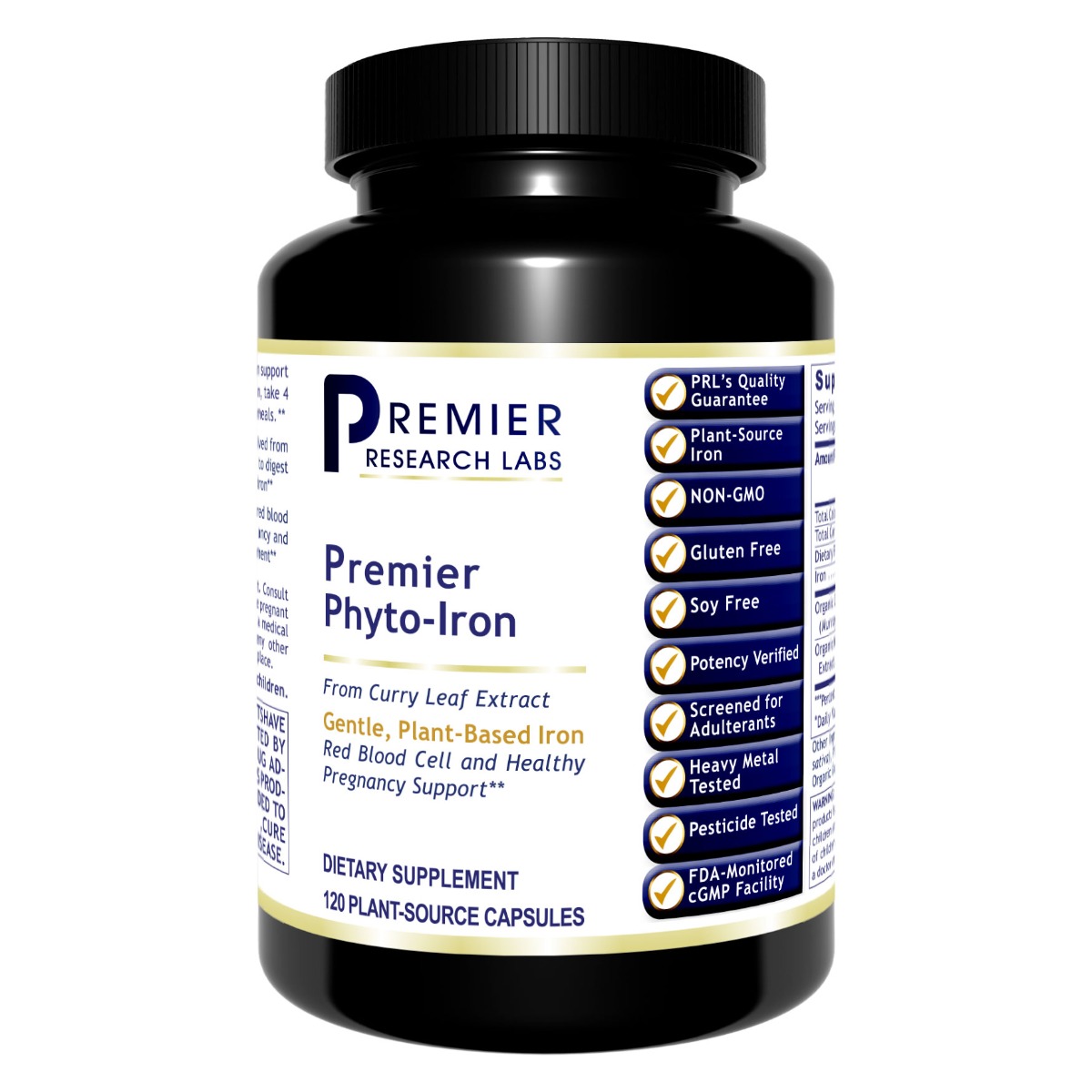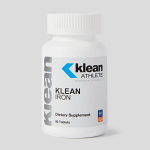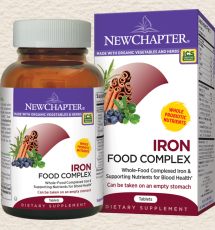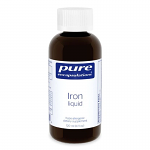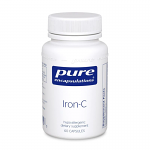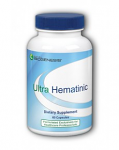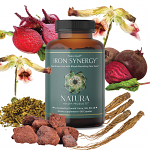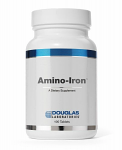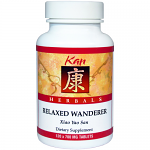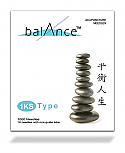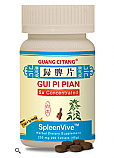Phyto-Iron, 120 caps
Phyto-Iron, 120 caps
| SKU | PRL206 | |
| Brand | Premier Research Labs | |
| Unit Size | 120 Plant-Source Capsules | |
| Dosage | For general iron support or pregnant and lactating women, take 4 capsules daily with meals.* | |
| Description | Nature’s Most Robust Source of Plant-Based Iron
Premier Phyto-Iron is a scientifically formulated nutritional supplement designed to deliver body-friendly iron as highly bioavailable, plant-based iron (non-heme form) that has been concentrated from non-GMO, organic certified curry leaf extract. It offers an excellent 18 mg. iron per serving. Exciting research demonstrates the body is able to effectively absorb, metabolize and store the biologically active iron phytocompounds of curry extract which promote healthy blood iron levels that are essential to the body’s tissue oxygen requirements and erythrocyte demands.* Premier Phyto-Iron is a scientifically formulated nutritional supplement designed to deliver body-friendly iron as highly bioavailable, plant-based iron (non-heme form) that has been concentrated from non-GMO, organic certified curry leaf extract. It offers an excellent 18 mg iron per serving. Exciting research demonstrates the body is able to effectively absorb, metabolize and store the biologically active iron phytocompounds of curry extract which promote healthy blood iron levels that are essential to the body’s tissue oxygen requirements and erythrocyte demands.* Premier Phyto-Iron contains a gluten-free, soy-free, nature-based source of iron that is digestion-friendly and easy to tolerate in comparison to the standard, synthetic iron supplements (such as ferrous sulfate) which have been shown to potentially cause gastric distress, including nausea and constipation.* Why Plant Iron ? In Premier Phyto-Iron, the nature-based plant iron compounds are scientifically extracted from the leaves of the curry tree (Murraya koenigii) and are present at a precise weight of iron. The phytochemical structure of plant iron is well documented. It is known to be partly present in the cytochrome B structure embedded in cell membranes, which contains iron protoporphyrin, and contains the storage form as ferritin. Revealing research demonstrates that consumption of plant iron from curry leaf extract is able to offer a higher bioavailability of blood circulating iron compared to the common iron gluconate form on the market (Greilberger, J. 2011. Curryblatt-Eisen günstiger als Eisensalze durch geringere pro-oxidative Effekte. Biogena Naturprodukte GmbH). Research also demonstrates that when consumption of iron from plant sources occurs, the iron is able to remain in its complete protein structure (nano-caged) as it is absorbed into the intestinal cell where it is then processed by the enterocytes. Premier Phyto-Iron’s curry extract is meticulously standardized and carefully processed to maintain the iron in its most body-friendly form as a complete ferritin molecule which allows the body to easily recognize, metabolize and properly absorb this micro-nutrient as a whole.* The broad-spectrum profile of plant iron and its accompanying plant antioxidants significantly reduce the tendency of premature oxidation of iron ions by minimizing free radical exposure and damage to the intestinal wall that is often seen with chemically synthesized iron salts such as iron gluconate or ferric sulphate.* Plant-Source Iron = Higher Bioavailability and Absorption In one study, the research team at ETH Zurich in Switzerland used serum hepcidin levels and stable iron isotopes to monitor iron absorption in the blood. Since hepcidin is a protein secreted by the liver that acts as a regulatory hormone, it controls the amount of iron in the body. The team discovered that hepcidin reaches a threshold of how much iron it is able to absorb at the small intestine before it switches off. Using nature-sourced plant iron allows a proper, more orderly, metabolism to take place, which means that the downstream physiological mechanisms for iron absorption are more controlled and effective. By allowing nature-based molecules to physiologically “take their course” through the body’s absorption pathways, plant iron may also be a way of assisting “non-responders“; these are individuals who are taking conventional iron preparations but are still unable to recover sufficient levels of blood-circulating iron. Besides the higher bioavailability of plant iron to cellular absorption, plant iron derived from curry leaf extract demonstrates a much higher tolerability for safe, long-term iron supplementation – minimizing the oxidative stress and the unwanted side effects of synthetic iron salts such as iron gluconate. Iron Salts = Potential Intestinal Stress Common dietary supplementation of iron can be in the form of iron salts as well as iron-rich vegetables. Typical iron supplements, as found in pharmaceutical formulations, are often in the form of an inorganic or organic salt or an iron complex. As an iron salt, supplements are commonly in the form of iron sulphate but may also occur as an iron complex with gluconate, dextran, or fumarate. By definition, iron salts contain the trace element, iron, in divalent and trivalent forms. The biological properties of iron salts are based on their ability to change valence and their ability to form compounds with both anionic and neutral molecules. These inorganic iron compounds in divalent and trivalent forms are absorbed very poorly, as they tend to form complexes with organic and inorganic compounds in the body that are difficult to dissolve, especially in the weakly alkaline environment of the upper small intestine. Iron preparations that contain these harsh iron salts sadly exhibit compromised gastrointestinal tolerability including flatulence, pain, constipation, and nausea. (Mutschler E: Arzneimittelwirkungen WVG Stuttgart, 2001). Iron = Essential for Healthy Blood* Iron is an essential mineral found in the largest amounts in the blood. Supporting iron homeostasis is essential to the health of numerous physiologic pathways and metabolic processes of the human body. Sufficient iron levels are required for the production of many enzymes, for cellular growth and the production of hemoglobin in red blood cells to promoter effective oxygen transport and thus cellular energy demand. About 70 percent of the body's iron stores are found in the hemoglobin of red blood cells and in myoglobin, the body’s specialized muscle cells. Myoglobin is an iron- and oxygen-binding protein found in the cardiac and skeletal muscle tissue and acts like an oxygen tank for muscle energy.* Iron-containing enzymes serve as an important component of several respiratory proteins and respiratory enzymes in the electron transport chain, the last stage of the respiration pathway where the most ATP molecules are produced.* Therefore, deficiencies of iron in these molecules can cause defective electron transport and cellular respiration and ultimately, poorer ATP production. Iron-containing enzymes also support neurotransmitter synthesis, collagen formation and carnitine production.* Maintaining healthy iron levels is critical for proper energy levels and functioning of immune surveillance, DNA synthesis and the breakdown of fatty acids.* The glycoprotein, transferrin, has a high affinity to ferric iron and plays an essential role in the transport of iron throughout the blood to reach its the targeted cells. There is little free-floating iron in the blood because iron is stored in the liver, spleen and bone marrow after binding to the ferritin and hemosiderin. When there is an increase in demand for iron, as long as adequate iron levels are available, iron can be released. Iron Deficiency = Often Overlooked Many individuals become deficient in iron at some time in their lives, especially menstruating women and the elderly.* According to the U.S. Department of Health and Human Services, iron deficiency is the most common nutritional deficiency in the U.S. and is also the leading cause of anemia in the U.S. In the U.S., the prevalence of iron-deficiency anemia in men under 50 is approximately 1% and for women of child-bearing age is approximately 10%*. Globally, iron deficiency is the most common micronutrient deficiency effecting 1.62 billion people. Often overlooked by physicians, the impact of iron deficiency on human health is significant and is the most prevalent cause of anemia worldwide. Iron deficiency may also result from poor digestion, long-term immune stress, intestinal bleeding, excessive menstrual bleeding, ulcers, excessive coffee or tea consumption, prolonged use of antacids, strenuous exercise, and heavy perspiration.* In severe cases, iron deficiency can even lead to lactic acidosis as cells switch from aerobic metabolism to anaerobic metabolism to compensate for low iron. Iron Loss During Exercise Iron loss during exercise can occur in several ways: sweating, hematuria, gastrointestinal bleeding, inflammation, and intravascular and extravascular hemolysis.* Sweating is involved in thermoregulation and is an important regulator in physical exercise. Sweating may lead to the loss of up to 2.5 micrograms of iron/L sweat during an exercise session. In addition, exercise-induced inflammation upregulates hepcidin which consequently lowers the iron absorption in the digestive tract.* Iron Deficiency Anemia in Women Women, aged 12 to 49, typically lose blood about once a month during menstruation. Iron is needed to make new blood that replaces the blood lost with each menstrual period. The risk of anemia is higher among women experiencing periods that are especially long or include very heavy bleeding. Pregnancy-related Anemia Pregnant women typically produce about 20 to 30 percent more blood during their pregnancy in order to supply oxygen to their baby, but it isn’t always enough for the mother to maintain healthy red blood cell and hemoglobin levels.* During pregnancy, this increased demand for iron can deplete iron stores in the body and in some cases, lead to iron deficiency anemia.* To ensure the proper growth and development of a baby, it is essential for pregnant women to take 50 percent more iron than usual (at a rate of 27 mg. per day instead of the usual 18 mg. per day). Women can also lose blood during childbirth. It is recommended that women who are pregnant or plan to become pregnant get their iron levels monitored and relate any symptoms of anemia to their health care providers. Anemia in Infants and Children The potential risks for anemia in children start during gestation. Blood iron levels should be regularly monitored from infants to teenagers to adults. During the early stages of rapid growth, there is a greater demand for red blood cells and higher iron requirements.* Iron deficiency may lead to a reduced concentration of hemoglobin and erythrocytes with vague symptoms that may eventually lead to some form of anemia. The reduced transport of oxygen may lead to an impaired iron supply to organs and tissues, leading to symptoms like anemia, digestive disturbances, fatigue, listlessness, fragile bones, brittle hair and nails, dizziness, irritability, pallor, obesity, low tolerance to the cold, impaired antibody production and reduced red and white blood cells.* Insufficient iron levels may also contribute to higher levels of fat in the blood and liver and may also have a negative effect on learning ability and endurance.* Iron deficiency can ultimately lead to a hypochromic microcytic anemia as characterized by the formation of small erythrocytes that lack hemoglobin. VITAMIN C = An Important Key to Iron Absorption Iron differs from other minerals because iron homeostasis is regulated solely by iron absorption because there is no physiologic pathway for iron excretion. Ascorbic acid enables iron absorption by constructing a chelate with a ferric iron at an acid pH that is able to remain soluble even in the alkaline pH environment of the duodenum. For this reason, 25-100 mg. of supplemental vitamin C has been shown to increase the absorption of plant iron by an additional four-fold. In addition, vitamin C can neutralize the effects of dietary phytates and tannins, which are known inhibitors of iron absorption. Plant chemicals such as phytates, found in grains, legumes, nuts, rice, and polyphenols, found in coffee or tea, can decrease the absorption of iron from 50 – 90 percent. (Tuecher B, Olivares M, Cori H. Enhancers of iron absorption: Ascorbic acid and other organic acids. Int J Vitam Nutr Res 2004;74(6):403-19.) Unlike humans, many animals can produce their own adequate amounts of vitamin C and therefore, do not need to obtain it directly from food. However, since humans are unable to produce vitamin C, they do need to obtain it from their diet. Vitamin C exists primarily in two basic forms: L-ascorbic acid and D-ascorbic acid. The L form can come from either a natural source (fruits, vegetables, herbs) or from synthetic forms (made in a test-tube). The D form does not exist in nature and is not typically used in supplements because it does not have the complex vitamin C content that the L form has. The “preferred” vitamin C form for the body is in the L form that has been derived from whole nutrient sources. One newer version, the liposomal form of vitamin C, is encased by a fat to potentially increase uptake, but it is often formulated with synthetic ascorbic acid, and thus is not preferred. Best Source of Vitamin C = Whole Nutrient Sources Premier Vitamin C, a fully plant-based nutritional formula, combines the timeless nutritional wisdom of ancient botanicals with the power of live-source nutrients to provide the pinnacle of nature-sourced vitamin C benefits. This product has NO added fillers, corn, gluten, or synthetic ascorbic acid to artificially misrepresent the total natural vitamin C content on the product label. Iron – in its most BODY-FRIENDLY Form In Premier Phyto-Iron, the blend of plant-sourced raw materials contains standardized forms of nutrients that are carefully processed to keep the vitamins in their potent form, without compromising the activity and co-nutrient value of each. As a result, this process is able to help concentrate and standardize a whole food/nutrient complexes of iron in its nature-preferred form. These body-friendly forms allow the body to easily recognize, metabolize, and absorb the iron*. Our advanced laboratory techniques are used to achieve desirable standardized forms, unlike other vitamin products which have been too highly purified or unacceptably altered from a natural state or which are even entirely synthetic. PRL’s Comprehensive Laboratory Testing Our PRL Quality Guarantee ensures that Premier Phyto-Iron and Premier Vitamin C – as well as all PRL products - meet and often exceed FDA requirements for identity, purity, strength, and composition. Our dedicated team of highly trained scientists at PRL perform an extensive panel of laboratory testing on all raw materials used in our products. Before production even begins, our team first authenticates the botanical identities in order to exclude raw materials that may have been adulterated with the wrong species or other look-alike herbs (more common that you might think). Our scientists also complete an in-depth phyto-forensic screening where they inspect for undesirable inorganic materials such as a wide range of herbicides and pesticides. Our vitamin and mineral-rich complexes have been scientifically developed without the use of unwanted chemicals, undesired excipients, or toxic carriers. Raw materials are extensively tested for contaminants such as heavy metals (including arsenic, mercury, cadmium, and lead), residual solvents in extracts and pathogenic microbiology. Magnesium Stearate: Just say “NO” Our premier quality nutrients have NO added non-nutritive or compromising additives such as unwanted chemical additives, questionable preservatives, synthetic flowing agents, stearate-based binders, glue-like resins, and other common undesirable tagalongs. In particular, we avoid compromising additives such as magnesium stearate, a cheap and undesirable processing agent. Experience the Power of “Ultra Clean,” Premier Quality Products As you can see, the extensive laboratory testing process by PRL’s highly trained scientific team in our in-house, state-of-the-art laboratory, helps to ensure the most robust quality of all our nutritional formulas. This is why PRL has gained such a sterling reputation over the years for producing “ultra clean,” premier quality nutritional products. PRL is proud to continue to offer these genuine quality formulas that practitioners across the U.S. and internationally, have come to trust and love. You are invited to experience the full clinical effectiveness of PRL’s comprehensive practitioner product line in your own practice. |
|
| Ingredients | Serving Size 4 Capsules
Other Ingredients: Organic Rice Concentrate (Oryza sativa), Plant-Source Capsules (cellulose, water), Organic Gum Acacia
|
|
